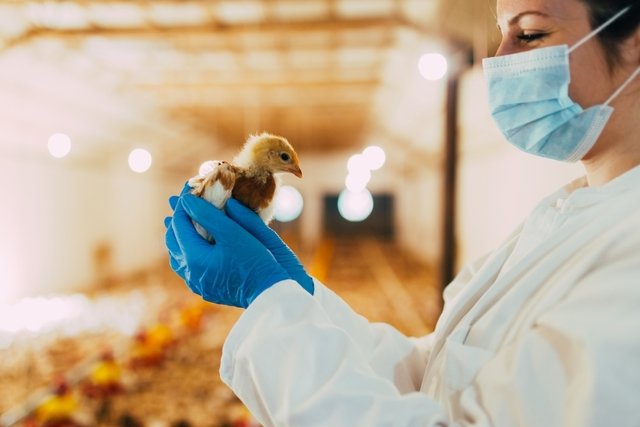Bird flu is a disease caused by the influenza A virus in birds, also known as chicken flu or avian influenza. It can be transmitted to humans mainly through direct contact with infected birds or through consumption of contaminated meat.
The symptoms of bird flu are very similar to those of the common flu and include fever, sore throat, general malaise, dry cough and runny nose. Although the symptoms are similar, bird flu tends to progress faster and is associated with a greater risk of serious complications, like difficulty breathing, pneumonia or bleeding.
Treatment for bird flu should be started as soon as possible by a doctor, either at home or in a hospital setting for oxygen therapy and continuous monitoring.

Main symptoms
The initial symptoms of bird flu are similar to those of the common flu and include:
- Sore throat
- High fever, above 38ºC (or 100.4ºF)
- Body aches
- General malaise
- Dry cough
- Chills
- Weakness
- Sneezing and nasal discharge
- Abdominal pain
Some people may also experience bleeding from the nose or gums.
Symptoms of the bird flu usually appear 2 to 8 days after contact with an infected bird or after eating contaminated meat that contains one of the influenza A virus, specifically types H5N1, H5N8, H7N9, H9N2, H10N3 and H3N8.
Also recommended: Cold vs Flu: Main Differences, How to Treat & Home Remedies tuasaude.com/en/cold-vs-fluConfirming a diagnosis
A bird flu diagnosis is first investigated by a doctor through a symptoms assessment and by assessing for any recent history of direct contact with live birds or raw bird meat.
To confirm a diagnosis, the doctor must order blood tests and an RT-PCR test, in which a sample nasal secretions is collected to identify the type of virus that is causing the infection.
This test can also be ordered to rule out other conditions that may present with similar symptoms, such as COVID-19 or meningitis.
Also recommended: COVID-19: Symptoms, Transmission, Tests & Treatment tuasaude.com/en/covid-coronavirusHow it's transmitted
Transmission of the bird flu virus to humans is rare, but can happen through:
- Contact with infected birth feathers, feces or urine
- Inhalation of small particles of the infected animal's secretions
- Ingestion of undercooked meat from contaminated poultry
- Unprotected contact with contaminated raw meat or slaughtered poultry
Transmission from person to person is not common, and there are few known cases of this type of transmission. However, this virus can mutate and develop the ability of passing from person to person through contact with secretions or droplets from sneezes and coughs.
Treatment options
Treatment of the bird flu should be guided by a general practitioner or infectious disease specialist. Treatment is aimed at preventing complications that can arise from this infection, as well as relieving symptoms.
The doctor may prescribe analgesics to reduce pain, antipyretics to manage a fever and anti-emetics to suspend any vomiting.
In some cases, the doctor may advise IV fluids for hydration and oxygen therapy for patients presenting with respiratory issues. More serious cases may further require intubation or mechanical ventilation.
The doctor may also prescribe antiviral medications within the first 48 hours after the onset of symptoms. These medications, like oseltamivir and zanamivir, can help the body fight the bird flu virus. Antibiotics are not recommended for this type of infection, as the infectious agent is a virus and not a bacteria.
Is bird flu curable?
The bird flu can be cured, but cases in human tend to be moderate to severe and require hospitalization. Therefore, in cases of suspected or possible,contamination it is important to seek urgent medical care.
Possible complications
After being infected with the bird flu virus, the person will present with symptoms similar to the common flu. However, complications such as difficulty breathing or pneumonia may arise as a result. Read more about the symptoms of pneumonia and how they are treated.
Populations that are more prone to having complications are children, older adults and those with a compromised immune system. Many times, the doctor will admit them to the hospital for symptom support and treatment.
Prevention measures
To avoid getting bird flu, you can take some prevention measures into consideration, such as:
- Avoiding direct contact with infected animals
- Always wearing rubber boots and gloves when handling birds, and being sure to perform thorough hygiene following
- Avoiding touching dead or sick birds
- Avoiding coming into contact with places with wild bird feces
- Eating well-cooked poultry meat;
- Washing your hands after handling raw poultry meat
If you suspect that an animal is contaminated or if you find dead birds, contact your local health department for further instructions.
